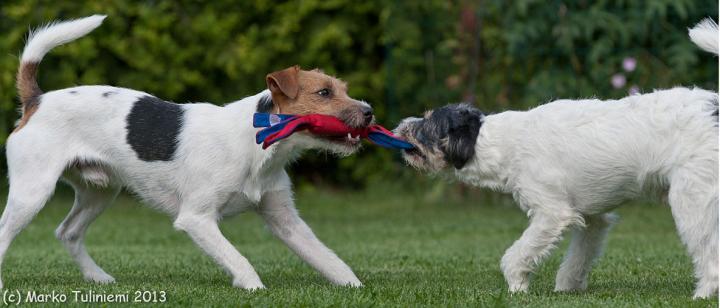
Credit: Marko Tuliniemi
In addition to humans, hereditary disorders of enamel development occur in dogs, greatly impacting their dental health and wellbeing. A recent study reveals canine enamel disorders similar to those found in humans, linking them with ENAM and ACP4, two genes previously described in humans.
The enamel that covers teeth is the hardest structure in the entire body. Its development is a complex process, and related developmental disorders may result in low enamel quantity, its absence or structural weakness. Alongside aesthetic issues, enamel defects have an impact on dental health and general wellbeing. Amelogenesis imperfecta (AI) is a group of hereditary developmental disorders affecting enamel, with more than ten associated genes reported in humans.
AI causes a significant wellbeing problem for dogs as well, yet the diseases, poorly known in canine medicine, often remain undiagnosed. Canine AI has earlier been linked with the ENAM and SLC24A4 genes in two breeds. In a recent study conducted at the University of Helsinki, two novel recessively inherited enamel disorders were described in dogs, and associated with causative variants in ENAM and ACP4. The identified genes have previously been linked with hereditary enamel development defects also in humans.
“We have observed enamel defects in several breeds. In this study, we found new gene variants in the ENAM gene of Parson Russell Terriers and the ACP4 gene of Akitas and American Akitas. The ACP4 finding was of particular interest, as its role in the development of tooth enamel is not well known, and there are no previous descriptions for any animal models,” says Marjo Hytönen, PhD, the first author of the study.
ENAM codes for enamelin, the key enamel protein, and is significant for achieving the correct enamel thickness during tooth development. A considerable part of human AI disorders are associated with mutations in the ENAM gene, whereas ACP4 codes for the phosphatase enzyme, whose specific significance to tooth and enamel development is currently unclear, but which may influence cellular differentiation and mineralisation. Dogs with an ACP4 mutation expressed thinning of the enamel and a slight mineralisation disorder.
Unlike mice, dogs have primary and permanent teeth just as humans, and the number of teeth is also similar. Therefore, dogs serve as an excellent model for human dental diseases.
“The spontaneous enamel defects found in this study resemble earlier descriptions of human patients, and are also linked with the same genes. Through gene tests, the gene findings will provide new diagnostic tools for veterinarians and breeders, which will also help with understanding the causes, mechanisms and hereditary nature of enamel defects. This is important for the development of early and improved therapies,” explains Professor Hannes Lohi, director of the research group.
Earlier, the group discovered a mutation in the FAM20C gene, impacting tooth hypomineralisation. Gene mapping will continue on various dental diseases in different breeds, including a publication which is currently being prepared on an unknown AI gene.
###
Media Contact
Hannes Lohi
[email protected]
Original Source
https:/
Related Journal Article
http://dx.




